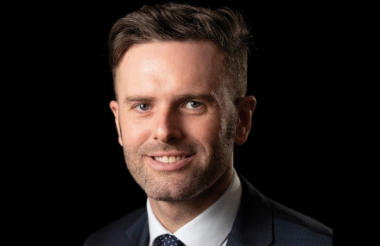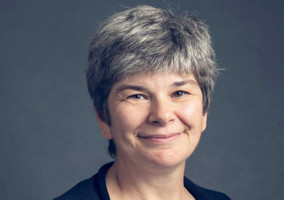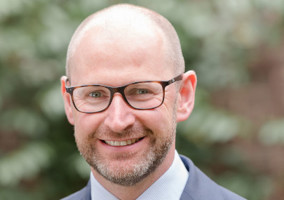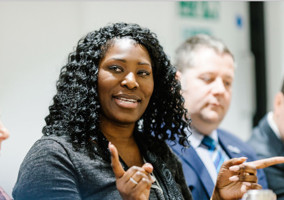When Craig Jones accepted the chief executive job at the Royal Osteoporosis Society (ROS) at the start of 2020, he was expecting to focus on raising the profile of the disease, which weakens bones and makes breaks more likely.
Nobody will be surprised to discover that Covid got in the way of that, and actually his first year was much more about repurposing the charity’s services alongside an internal restructure to ensure the organisation's long-term future.
However, he’s optimistic that as the country emerges from the crisis, there will be opportunities to get the condition “on the map”.
Joining in pandemic
Jones joined ROS on what was essentially the first day of a UK-wide lockdown.
“By the time I started, everybody had been asked to work from home. So I went into the office and there was nobody there, and there hasn't been ever since,” he says.
It was his first chief executive role, with Jones having previously been director of communications for the Advertising Standards Authority. Outside of his day job he sits on the board of the Royal College of Anaesthetists and is a lay member of the National Organ Donation Committee at NHS Blood and Transplant.
“I wanted to take on a leadership role. It seemed sensible to do in my day job the kind of subject matter I was doing outside of work,” he says.
The challenge of leading an organisation that had gone “under the radar” was another pull factor.
“Despite the fact that we've got 3.5 million people who are living with osteoporosis, only a quarter of the public can tell you what the condition is,” he says. “So, there's a huge public awareness challenge.”
This isn’t Jones’ first experience of the charity sector. His second job was as a communications director at a children’s charity.
“I found it quite sharp edged, actually, a very competitive field,” he says. But this time his experience has been “completely different”.
“The reason for that is that I've found every chief executive I've talked to to be incredibly helpful and really open with advice.”
Difficult decisions
In Jones' second week, the charity worked out that its income was likely to fall by around 30% as a result of the pandemic. That was about £1.2m of its £4.6m income, forcing some difficult decisions.
One of the first things was to address how to use the government’s furlough scheme in a way which would mitigate some of the lost income, at a time when demand for the charity's helpline services had surged. During the first lockdown, NHS bone-health services had been paused and people were worried about visiting their GPs.
This meant making some “really tough” decisions “quite quickly”, says Jones. Furlough at the charity was concentrated on those staff in “back office roles”, but it was nevertheless “really uncomfortable to be standing people down at a time when people were telling us on our helpline that they have nowhere else to go”.
Being open with colleagues
Later in the year there were redundancies as the charity restructured, losing around a third of its 65-strong team.
“It's been tough for people. But I've been really quite humbled by the goodwill that's been shown to me,” he says.
He tried to be as open as possible with staff about the challenges. “The way we did this was to basically communicate, communicate, communicate, constantly take people with us. We had sometimes weekly meetings where we talked to all of our employees all at the same time. And sometimes we were not telling them what the answers were, because we were still looking for the answers.”
By being open, “things are not a surprise”, he says. “People can see the kind of difficult, choices you're having to face up to and that they have some ownership of that.”
ROS also sought out new types of income. These included getting funding from the National Lottery Community Fund to support the helpline and funding from a foundation to create new video content.
The charity also successfully bid for government funding in April. “We had to lobby really hard to make sure that our case was considered, but we got there,” he says. This allowed for an outbound calls project to connect with people who may need support.
“It took going to sources that we hadn't used before and being a bit more adventurous.”
Reshaping its service
ROS has now moved to a much more digital delivery model. Unable to provide in-person information sessions or support groups, it made redundancies in those teams and focused on increasing its online content.
ROS used the knowledge and insight it gained from speaking to people via its helpline and making outbound calls to identify key themes needed for website articles.
“We got something like a quarter of a million hits,” he says. “Our sense was that elderly people are coming online for the first time and becoming more familiar and comfortable with it, which gives us loads of opportunities going forwards.”
With funding from the Garfield Weston Foundation, ROS has also launched a range of videos about bone health, sharing insight from senior clinicians with people who have been newly diagnosed.
“We haven't, unfortunately, got these regional points for people to access in the way that they used to. And that's a real shame,” he says, but adds: “Some of the best minds in the field in bone health, they can be on demand flick of a switch available, and we will reach many more people than these local events ever reached.”
The charity is now using Microsoft Teams to hold support groups, with plenty of elderly people active via these medium.
“As soon as you get some of them on there, they provide training to others, and they help upskill other groups in the region,” he says.
Jones hopes to further expand the charity's digital services “to have a really exciting range of webinars and videos that can take advantage of this migration of elderly people online and reach more people in a consistently high-quality way”.
‘This lockdown, all our services are fully open’
For Jones, the tough restructuring choices that were made in the middle of last year have meant that when the second and third lockdowns arrived, ROS was “coming out fighting for our service users and members of the public”.
All the charity's staff returned from furlough on 31 July and the charity hasn’t used the scheme since. “We wanted to not leave people in limbo, wrestling with a lot of uncertainty. We wanted to face up to the problems that the pandemic posed for charities and bring people back and get them back at work.”
This has meant that ROS has had full staffing on its services. “We are there for the public and standing with our NHS colleagues.”
Hard to cut through in a pandemic
A year ago, Jones’ plan was for a big advocacy push to “reposition the organisation as a charity that everybody knows about and a condition that everybody can do something about to save their quality of life when they get older”.
He raises the fact that osteoporosis has only been mentioned 31 times in parliament over the last five years, which he calls a “disservice” to the 3.5 million people living with the disease.
“There's a misconception that fractures and osteoporosis are just a part of getting older,” he says.
Raising awareness could “save the NHS money and save a lot of people from a lot of unnecessary fractures”.
Unfortunately, Covid has meant that a lot of that was difficult last year, as it was “quite hard to get cut through for these messages” when public health leaders were concentrating on the demands of the pandemic.
However, he is hopeful that later this year the charity will be able to focus again on this work, and yesterday there was a House of Lords debate where nine peers were supportive and one talked about a focus on osteoporosis being more important than ever.
“I would like to begin putting osteoporosis on the map more.”
Lessons for the future
Jones says it is too soon to know if there is anything that ROS should have done differently during the pandemic.
“I think it’s too early to draw firm conclusions about the impact of decisions we’ve made in such a frenetic, fast-moving environment,” he says.
“Financially, the ROS has offset most of our initial income hit from the pandemic, and lots of the digitisation of services we’ve done is modernisation sped up. But we’ll need to see what the ‘new normal’ is. It’ll be about understanding the motivations of employees and service users after the pandemic is over.”
In the meantime, his advice for the government is clear.
“If I had my chance to speak to a minister directly, I would want to try and help them understand how they could spend a few pounds on our services now, help us keep our helpline open, and help us keep our advice services open. And that will prevent more severe problems building up in the NHS later,” he says.
Related articles












